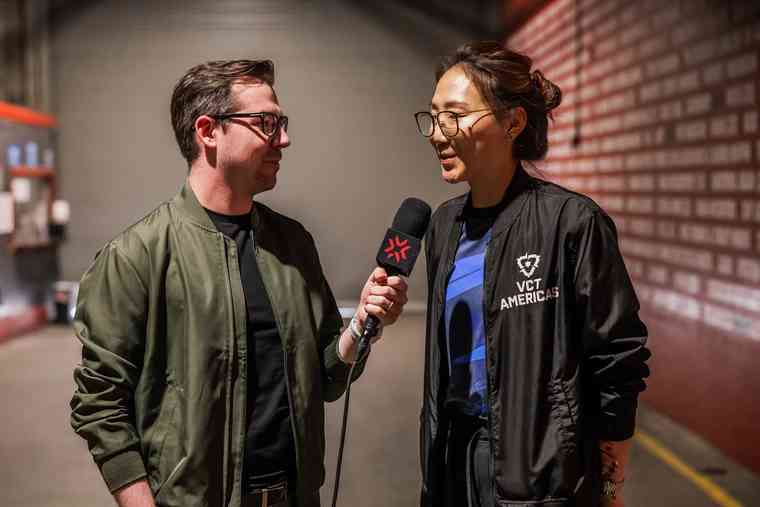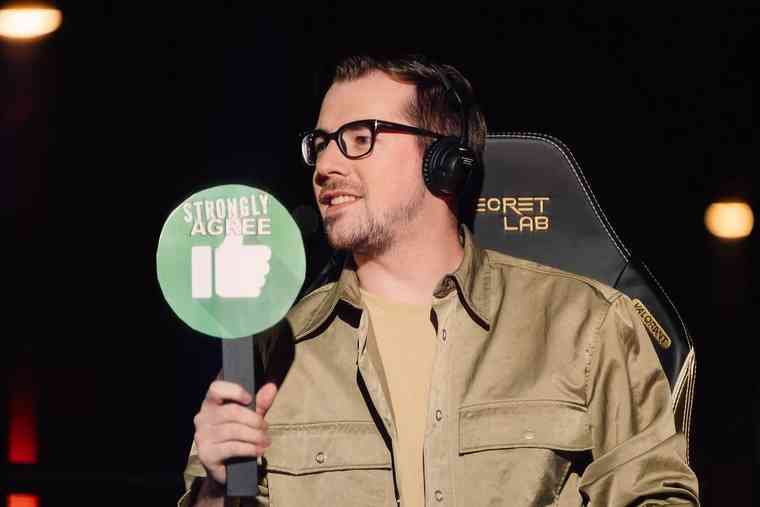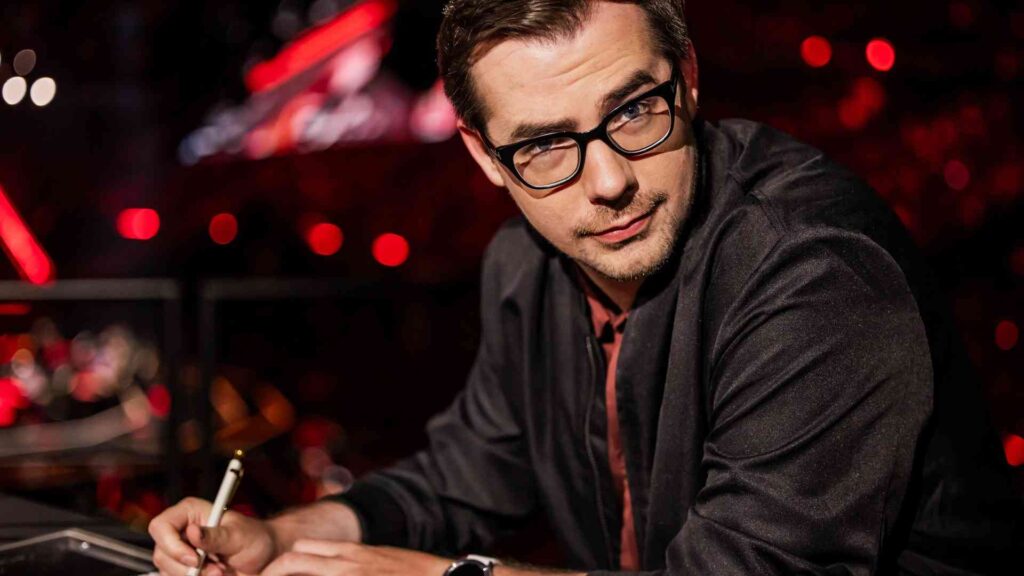Fans, players, and everyone in between gathered in Los Angeles, California to take part in Valorant Champions, which served as the ultimate conclusion to the 2023 VCT season. As such, the 16 competing teams will see their journeys end after working through a long taxing season featuring an endless stream of events, matches and practice with little breaks in the process.
Regardless of the fact, it’s precisely because of the possibility of attaining victory and glory these people put up with the grueling demands of the pro scene in order to become indisputable legends, just like how it turned out for past champions like Acend and LOUD.
Similarly, while the form of work may differ for other people within Champions, like broadcast talent, the same sentiment can be said to describe their diligence as those aforementioned players. For some, like English-speaking caster Seth “Achilios” King who has been covering Valorant; in addition to other games, since First Strike 2020, working in Champions 2023 helped remind them they’re still on top of their game within their craft, but at the same time, they must continue to work hard lest they relinquish their spot to somebody else.
Even so, for Achilios, who’s been working in esports for nearly a decade and has only been able to work an event in front of an English-speaking audience for the first time recently, being in Champions presented an opportunity for him to reflect on his career and the road he took to get to Los Angeles.
During the grand finals of Champions 2023, BLIX caught up with Achilios to talk about his experience covering the event in Los Angeles, how it compares to prior events he did for other titles, his casting partnership with Clinton ‘Paperthin’ Bader, his upbringing in New Jersey and more.
Contents
Experience covering Champions 2023
Pedro Romero, BLIX: As of the time of this interview, it’s the grand finals for Champions 2023 and you were on the analyst desk. I believe you’re still doing it as I speak so how’s the experience in the event for you in particular?
Seth “Achilios” King: It’s been absolutely wonderful to be here. The fan turnout at the KIA Forum has been completely beyond belief. The seats are packed and the crowd is riled up. Any call from the casters and any play that is made in-game, you can tell that the fans are right there with it as far as the players are concerned with the energy. They’re just matched blow for blow so as somebody who hasn’t really gotten to do a live event in a very long time, especially one where–I mean, obviously, I did the VCT Pacific finals–when I’m casting and I’m on the analyst desk, it’s in English, the audience is able to hear the words that I’m saying, I’m not just going on in the stream, that hasn’t happened in the last three years. The peak of COVID or right at the start of COVID, I should say, was the last time I was able to do that and it feels so good to be back in this position.
BLIX: Diving into your experience in the analyst desk, it’s done during the Champions which is the culmination of the entire VCT year. You mentioned the significance for you in relation to all the past work that you’ve done, so did you feel any nerves in working this event? Also, how different is it from the other events that you’ve done before, be it as a caster or analyst?
Achilios: I think you always get nervous. If you don’t get nerves, then I don’t think you’re taking things as seriously as you need to or you might be overconfident because for me, when it comes down to casting, there’s this constant drive to want to improve to get better. If you become complacent, I think that that’s when you start falling behind because there are so many people who want this job. There are so many people who really strive for it. There’s people at the top who are excellent at this job. All of my colleagues that are here very much fall into that category so I find that if you go up to a cast and you don’t have some level of nerves, then you’re in the wrong headspace.
Ever since I was young, I started out in performing arts and I was doing plays and I remember always being completely fearful with nerves and just being afraid to walk out on the stage. It didn’t matter if it was the first time that I did a show or if it was the seventh night of doing that show, I always had that same experience and then as soon as I stepped out onto the stage, the nerves would drop away and I would go and do my performance and I would do the best thing that I could and I treat casting very much in the same regard so that’s kind of just how I approach it.
Being back here, obviously, there is also that differentiation of having the crowd here, you being able to hear the reaction and playing off of them. Whether it’s giving the crowd something that they want to hear or purposely giving something that you know that they’re going to boo, playing around with their emotions to just have some fun and have that banter between you and the thousands of people that are sitting around you is an experience that, once you’ve had it, you don’t want it taken away and that’s why the last couple years where we weren’t able to have a lot of live events was just so tragic.
You can tell that every single caster basically suffered from that because we feed so much off of the audience’s energy so being able to come back in, there was definitely the nerves but it only takes a little bit to kind of shake off that rust and then feel right at home once again.
Comparing Valorant to other games Achilios has covered
 Achilios’ road to Champions 2023 saw him take numerous stops along the way, including stints in the Overwatch League and the LCK. Credit: Colin Young-Wolff/Riot Games
Achilios’ road to Champions 2023 saw him take numerous stops along the way, including stints in the Overwatch League and the LCK. Credit: Colin Young-Wolff/Riot GamesBLIX: Going in line with what you’ve been doing, you’ve been covering other games such as Overwatch in addition to Valorant. What’s been the biggest adjustment you had to make between covering Valorant and those other games?
Achilios: Obviously, when you’re doing two FPS titles, it can be a little bit different and this is something that, when I was first looking to do Valorant, there were some concerns from the opposite side. When I started doing Overwatch, I was already doing League of Legends. I was casting [LoL], I knew every single character in the game, I knew every single ability that each champion had. There were 130-something [champions] at the time when I was casting it and then I started doing Overwatch and I never once had a crossed wire. I never once had an issue. I never forgot what game I was commentating, or anything like that. You just have to compartmentalize, I guess, in each game.
When I’m in Valorant world, I turn off my brain and Overwatch doesn’t exist in that, and then when I’m casting Overwatch, I turn off the Valorant brain and Valorant doesn’t exist. I think that’s the best way to approach not having stumbles and mixing up things. Obviously, it does happen. There was a time where I said the LA Valorant instead of the LA Valiant. I said “agent” instead of “hero” but those are literally the only two mistakes I think I’ve ever made while casting both of these titles, so being able to shut off the one side and then engage the other one, I find that fairly easy to do. As long as you really understand the game that you’re casting, I think that you could cast an infinite number of titles simultaneously in theory.
BLIX: Has there been an instance in which you were able to combine various games at one time? You mentioned the mistakes that you made, but has there been an occasion in which you were able to combine various games at once, such as through using a term or anything like that?
Achilios: As far as terms go, we have some bleed over terms. Dive, I think, is one of the best ones. I can’t take credit for that. I believe it was Bren, Josh and Mimi who were the ones that widely started using “dive.” A dive comp in Overwatch. You have that whole thing. “It’s gonna be that Genji, that Tracer and that Winston that are getting into the backline and taking apart the supports.” We have that same term and we use that for the likes of a Raze, a Jett, or a Yoru. “Somebody who’s going to be jumping into the backline and catching people off guard.” It’s not quite the same, obviously, because you don’t have, necessarily, a healer. You don’t have somebody who’s sitting back there and who’s weaker and more vulnerable that can’t take down a Genji or or a Winston.
Everyone’s at a bit of a more even playing field in Valorant, but we still refer to that as “dive” because it’s all about getting into the backline. I think there’s a couple more different examples but that’s the most prevalent one in my brain though.
Working with Paperthin
BLIX: Regarding your co-caster Paperthin, who is someone I talked to a short while ago, he talked about how the dynamic with you has been given that you guys have been casting together in Valorant for quite a while. How do you view your partnership with Paperthin and how has your relationship with him grown? Also, which aspect has grown the most?
Achilios: Honestly, it was an unexpected partnership because when we first started off doing First Strike, I think both Clinton and I assumed that we weren’t going to be casting together because Wolf was also casting First Strike and he was my co-caster in Overwatch League. We kind of assumed like, “Okay, myself and Wolf are gonna be paired up. It’s gonna be Valdes and Paperthin as the other duo for First Strike,” and that just wasn’t how Riot, at the time, decided to do the schedule so they had separated Wolf and I and then I ended up casting with Paperthin. Admittedly, I was a little upset about that. I was like, “Oh, I had so much synergy with him.”
 Since First Strike Korea, the Paperthin-Achilios duo remains as strong as ever. Credit: Colin Young-Wolff/Riot Games
Since First Strike Korea, the Paperthin-Achilios duo remains as strong as ever. Credit: Colin Young-Wolff/Riot GamesI think Clash Royale was the one game that I had casted with Paperthin then by this point and I didn’t really have any synergy with Clinton aside from just being friends with him, but okay whatever, I’m here to do the job so we’ll do the job and we ended up doing it and it went well so we were overall happy with it. Then, as time came on for 2021 VCT Korea to begin, Wolf and Valdes were busy with the LCK side of things so they couldn’t really fit into the schedule and they were looking for casters so obviously, Paperthin and I did First Strike so I said ‘let’s stick with it.’ There’s always growing pains.
It’s a bit like a relationship when you’re trying to get to know somebody or when you first started dating. You learn each other’s quirks and whatnot while you’re casting. You start understanding things that you don’t like that they do and they find out things that they don’t like about and it’s stuff that you do and then you just, like a mature couple, sit down and discuss them and work through your problems.
BLIX: By that analogy, are you married now?
Achilios: Yeah, I’d say by this point we’re married. You can have an argument and one of you sleeps on the couch for a night and then everything’s fine in the morning. But for the most part, I’d say it’s been good. We rarely ever have any kind of disagreements. We’re very concise with our expectations about each other and the things that we want to do when we go into a cast, the points that we want to hit, we talk about those things and then we just go out and we do our best to execute.
From New Jersey to the world
BLIX: Going into the personal side, to go from Newport, New Jersey (your birthplace) to now being here as one of the major English talents in Valorant and other esports titles, what does that mean to you
Achilios: It’s kind of one of those small town stories about the person who got out, I guess. I don’t know how many people there are in the population of my town. It feels like it’s something around 600. It’s a really small, very rural farmland area where most people just kind of work maybe within an hour of there while they don’t leave the state. Growing up, I didn’t have good internet.
I was widely playing console games and it wasn’t really until I got into high school where I was actually able to start gaming online. I actually started going to an internet cafe when I was probably about 11 or 12 then it opened up nearby because they had good computers. I was still running Windows 98 or maybe even Windows 2000 or something like that. Either way, I didn’t have a good rig so I couldn’t really play anything at home until I got into high school and that’s when I really started getting into PC gaming.
 Born in the northeastern United States, Achilios has come unto his own as a full-fledged esports broadcast talent. Credit: Colin Young-Wolff/Riot Game
Born in the northeastern United States, Achilios has come unto his own as a full-fledged esports broadcast talent. Credit: Colin Young-Wolff/Riot GameI never once, in my time living in New Jersey, thought that I would be able to become an esports commentator and, I don’t know, go anywhere. I had aspirations for the gaming industry, not necessarily esports. I was interested in potentially becoming a writer on things like World of Warcraft games that had a lot of lore behind them. I was interested in that and videography, which is what I studied in college, so I thought maybe I could get a job working in Hollywood at some extent and become a cinematographer, whichever it is.
That was kind of the only way that I saw myself getting out and getting into the entertainment industry, I suppose, and then when I ended up having a combination of esports and film in a job offer from Team Liquid to become a videographer, I leapt at the opportunity. I moved out to Los Angeles and it sucked but I stuck with that for a while and I got to meet a ton of great people who I’m still friends to this day eight years later, some of which I just saw earlier on here at this event.
I didn’t like living in Los Angeles. I wouldn’t want to live here long term, but I also wouldn’t take back that year for anything because it set me up to then move on to be in Korea where I now live. I find Korea to be my permanent home. That’s where my my cat, my car, my wife, all of my comfort and also my best friends in the world are. Looking back on growing up in Newport, New Jersey, I think that if I had a time machine and went back and told my younger self, “Hey, you’re gonna get out of here,” I would have assumed that I was a liar or I would have just jumped for joy and said, “Oh thank God.”


